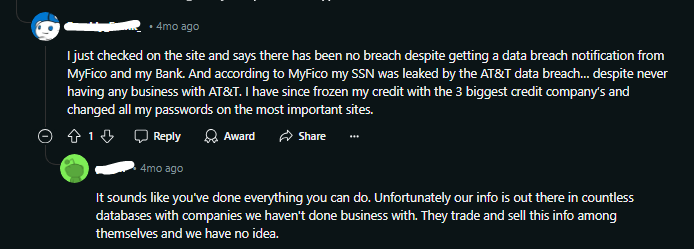Table of Content
Have you ever had anxiety about the security of your personal data?
Millions of people experienced the nightmare when AT&T, a significant player in the telecom sector, experienced a disastrous data leak.
How could a business with a reputation for strong security let this happen? Let's explore the terrifying specifics of this incident and what it means.
What Happened in the AT&T Breach?
In April 2024, AT&T revealed that a significant attack between April 14 and April 25 had compromised almost all of its wireless subscribers.
A hacker exfiltrated files comprising "records of customer call and text interactions" between May 1, 2022, and October 31, 2022, as well as on January 2, 2023.
According to AT&T, consumer information was "illegally downloaded from our workspace on a third-party cloud platform."
The company stated that the third-party service was "used by thousands of organizations," although it did not name them directly. The hacker used credentials obtained from AT&T employees to access the third-party platform.
I’m pressing AT&T for answers after a cyberattack compromised the data of millions of Americans.
— Rep. Abigail Spanberger (@RepSpanberger) August 1, 2024
As a Member of the U.S. House Intelligence Committee and a former intelligence officer, I have serious concerns about the implications of this breach.
More on @JulieMasonShow1: pic.twitter.com/1nmkMCEwb8
The hack damaged about 100 million AT&T customers, including those with business and consumer lines. Anyone affected is being provided with a free credit monitoring service. In addition, AT&T stated that it is collaborating with law enforcement to investigate the event.
What was the Impact on AT&T Customers?
Due to a significant data breach, nearly all of AT&T's customers' call and text history was made public. Even though Social Security numbers and other sensitive information were protected, identity theft and privacy issues could still arise from the data release. As a result, customers risk losing money and getting into legal trouble.
Cyberattack Targets Millions of AT&T Users
AT&T reported that the data may have affected about 109 million customer accounts, although it does not think the information is accessible to the general public.
AT&T stated on Friday that:
“The data does not include the content of calls or texts, personal information like dates of birth or Social Security numbers, or other personally identifying information.”
According to the firm, some information commonly included in usage details—like the timestamp of calls, texts, or client names—is not included in the hacked data. However, AT&T stated that there are frequent methods for locating the name linked to a particular phone number using freely accessible internet resources.
Cybersecurity experts agree that user tracing can be done using these kinds of data. Thomas Richards, principal consultant at Synopsys Software Integrity Group, stated:
“While the exposed information doesn’t have sensitive information, it can be used to piece together events and who may call who. As private calls and connections could be exposed, this could impact people's private lives.”
What are the Potential Privacy Risks from Exposed Data?
Numerous privacy risks may arise from the call and text message records within the data made public by the AT&T hack. Among these dangers are:
Exposing Personal Connections
Call logs and text messages can reveal the people you communicate with most frequently, allowing you to identify close friends, family, coworkers, and business connections.
Exposing Visited Places Based On Call Trends
Based on the cell towers your phone is connected to, it could determine where you were by looking through call logs. This might disclose your home address, place of employment, or other regularly visited places.
Enabling Targeted Advertising
Call and text advertisers can use data to create a profile of your preferences and interests. Based on this information, You may be targeted with advertisements that are more likely to be relevant to you.
Increasing the Risk of Phishing Attacks and Social Engineering Scams
Call and text records contain information that scammers can use to craft more convincing phishing or social engineering scams. Their impersonations are more convincing since, for instance, they might be familiar with your name, contacts, and other personal information.
How to Take Immediate Action in Case of a Data Breach
Any organization that experiences a data breach could suffer greatly, with possible consequences including serious financial losses, harm to the firm's brand, and legal action. Immediate and firm response is necessary to lessen the effects of a breach.
- Change passwords, isolate impacted computers, and monitor network activity to contain the breach.

- Notify top management, legal counsel, and law enforcement, among other important parties, if needed.
- Create a communication strategy for the impacted parties and extend assistance, like credit monitoring.
- Check your credit card and bank statements frequently for fraudulent transactions. To safeguard your credit, put a freeze or alert on your credit report.

- Stay watchful for suspicious texts, calls, or emails purporting to be from AT&T or other companies.
- If you have an incident response plan, follow it. If not, consider hiring outside cybersecurity specialists.
- Examine the incident to find weaknesses and strengthen security protocols.
Protect Yourself Against Online Threats with PurePrivacy
Identity theft and data breaches are serious risks. With PurePrivacy, you can easily protect your online presence and maintain control over your personal information.
Use Dark Web Monitoring
Scan the dark web for any compromised personal data and promptly notifies you if it does.
View Data Broker Details
Provides information on the data brokers' practices and identifies which ones are involved in data collection.
Social Media Privacy Score
Assesses your social media privacy settings and provides practical advice to improve your online safety.
Tracker Blocker
Protects your online activities by stopping websites and third-party trackers from gathering browsing data.
Frequently Asked Questions (FAQs)
-
Was there a recent data breach at AT&T?

AT&T discovered in April that customer information had been unlawfully taken from our workspace and stored on a third-party cloud platform. They started an investigation and consulted with top cybersecurity specialists to determine the kind and extent of the illegal behavior. They've taken action to block the unauthorized entry point.
-
How can I find out if someone hacked my data?

If the service you use has notifications, turn them on and watch for any unusual login attempts. Watch out for emails and texts purporting to be password retrieval scams, and only update your account information by visiting the official website.
-
What occurs if someone gains access to your data?

Data made public during a hack creates a major fraud risk. Following a data breach, the following sensitive data could end up in the hands of criminals or on the dark web: your entire name and Email addresses.
In Conclusion
The security flaws in modern technology are brought to light by the AT&T data leak. Customers need to be careful about securing their data, and businesses like AT&T must put strong security measures in place to ensure online safety.






